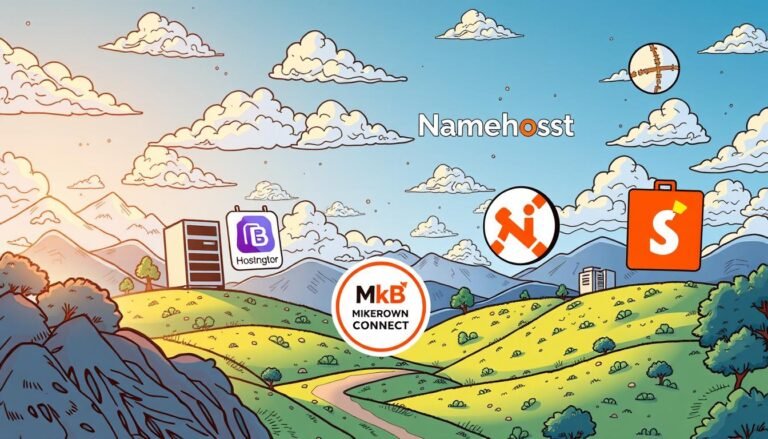My Web Hosting

As a web development pro, I’ve seen how important it is to choose the right web hosting provider. Your choice can greatly affect your website’s success. In this guide, I’ll show you the 10 must-have features when looking for a web host.
Web hosting is the foundation of your online presence. It’s where your website resides, and finding a reliable provider is crucial. With many options available, picking the perfect hosting solution can be challenging.
Did you know that about 43% of small businesses are victims of cyberattacks? This highlights the need for security features from web hosting companies. It’s just one of the many factors to consider when making your decision.
In this article, I’ll explain the key web hosting features for your website’s success. We’ll cover uptime guarantees, customer support, and more. Let’s explore and find the perfect hosting provider for you!
Key Takeaways
- Uptime percentage should be as close to 100% as possible
- Security features are crucial for protecting your website
- Consider bandwidth and storage space for your site’s needs
- Look for reliable customer support options
- Scalability is important for future growth
- Check for email hosting and management tools
- Evaluate the control panel and user interface
Understanding Web Hosting: The Foundation of Your Online Presence
Web hosting is key to your digital presence. I’ll explain what it is, why it’s important, and the different types. This will help you pick the best for your website.
What is web hosting?
Web hosting stores your website files on servers. This makes them available to everyone online. With over 1.5 billion websites, only 200 million are active. This shows how important reliable hosting is.
Why choosing the right web host matters
Choosing the right web host is vital for your site’s success. It affects your site’s accessibility, security, and how well it works. For example, dedicated hosting can keep your site up 99.9% of the time.
Types of web hosting services
There are many hosting types, each for different needs:
- Shared Hosting: Budget-friendly for beginners
- VPS Hosting: Offers dedicated resources and grows with you
- Dedicated Hosting: Gives you full control and top performance
- Cloud Hosting: Spreads your site across servers for reliability
- Managed Hosting: Easy for those not tech-savvy
| Hosting Type | Best For | Key Feature |
|---|---|---|
| Shared | Beginners | Cost-effective |
| VPS | Growing sites | Scalability |
| Dedicated | High-traffic sites | Full control |
| Cloud | Variable traffic | Reliability |
| Managed | Non-technical users | Convenience |
Knowing about these hosting types helps you choose the right one for your site. Remember, your choice affects your site’s performance, security, and how it grows.
Reliability and Uptime Guarantees
Choosing a web hosting provider means looking at server uptime closely. Hosting reliability is key to your online success. Let’s explore why uptime is so important.
Web hosts promise uptime from 99% to 99.999%. At first, these numbers seem close. But, a 99% uptime means your site could be down for up to 3.65 days a year. On the other hand, 99.9% uptime means only about 8.76 hours of possible downtime each year.
For the best website availability, aim for hosts with 99.99% or higher uptime guarantees. This ensures your site is up for almost all of the year. Some hosts, like DreamHost, even promise 100% uptime!
“Even a few seconds of downtime can result in significant financial losses, emphasizing the critical impact of uptime on website revenue.”
To check a host’s claims, use tools like UptimeRobot or Pingdom. These services give honest views of a provider’s performance. Remember, uptime keeps visitors happy and boosts your search engine rankings.
| Uptime Guarantee | Downtime per Year | Impact on Business |
|---|---|---|
| 99% | 3.65 days | Significant revenue loss, poor user experience |
| 99.9% | 8.76 hours | Moderate impact, potential customer frustration |
| 99.99% | 52.56 minutes | Minimal disruption, generally acceptable |
| 99.999% | 5.26 minutes | Negligible impact, excellent reliability |
When picking a hosting provider, look beyond uptime guarantees. Check their infrastructure, support, and downtime compensation policies. These all add up to a reliable hosting experience, keeping your site up when it matters most.
Web Hosting Features: Essential Elements for Success
Choosing the right hosting features is crucial for your website’s success. Let’s explore the key elements to consider when picking a web hosting provider.
Key Features to Consider
When searching for cost-effective hosting, focus on these important features:
- Server space and bandwidth
- Uptime guarantee (aim for 99.9%)
- Security measures, including SSL certificates
- 24/7 customer support
- Email hosting services
- One-click installers for popular platforms
Bluehost is an excellent choice for Web Hosting…You can get a great discount on the annual plans using my affiliate link. It doesn’t cost anything, and we both win…So click this link and check them out👉🏼👉🏼Click Here
Impact on Website Performance
The features you choose greatly impact your website’s performance. Fast loading times and stable servers are vital for a good user experience and SEO. Poor hosting choices can lead to slow speeds and frequent downtime.
Balancing Features and Cost
Finding the right balance between features and cost is essential. Shared hosting starts at $1 per month, making it affordable for small businesses. But, as your site grows, you might need more resources. Look for providers that offer scalability to avoid server migration hassles later.
| Hosting Type | Cost | Best For |
|---|---|---|
| Shared | Low | Small websites, startups |
| VPS | Medium | Growing businesses |
| Dedicated | High | Large, high-traffic sites |
Some providers charge extra for exceeding traffic limits or additional services. Always check the fine print to avoid unexpected costs. By choosing the right hosting features, you can ensure your website performs well without overspending.
Storage Space and Bandwidth Considerations
When picking a web hosting provider, I focus on disk space and bandwidth limits. These are key to how much content my site can hold and how many visitors it can handle.
Disk space is for storing my website files, like images, videos, and text. For a small business site, 10GB to 100GB is usually enough. But, if I have an e-commerce site or one with lots of media, I might need 50GB to 200GB or more.
Bandwidth, or data transfer, is also crucial. It shows how much info can move between my site and visitors. I figure out my bandwidth needs by multiplying monthly page loads by my site’s size. For a growing business, I suggest a plan with at least 1TB of bandwidth or an unmetered option.
| Website Type | Recommended Disk Space | Recommended Bandwidth |
|---|---|---|
| Small Business | 10GB – 100GB | 500GB – 1TB |
| E-commerce | 50GB – 200GB+ | 1TB – Unmetered |
| Multimedia | 100GB – 200GB+ | 2TB – Unmetered |
Many providers say they offer “unlimited” resources, but it’s important to check the details. These plans usually have limits to avoid server overload. For security, I choose a plan with clear limits that are higher than my current needs. This way, I have room to grow.
Security Measures and SSL Certificates
Website security is very important for any online presence. As cyber threats grow, it’s key to pick a web host with strong security. Let’s look at the main security features you should find in a hosting provider.
Importance of Website Security
Keeping your site safe is not just about protecting data. It’s also about keeping your reputation and profits safe. Did you know that every minute of downtime can cost businesses an average of $427? Also, the average cost of a data breach in 2023 is around $2.98 million. These facts show how important solid security is.
SSL Certificates Explained
SSL certificates are essential for any website. They encrypt data sent through your site, making it safer for visitors. Many hosts, like Hostinger, offer free SSL certificates with every plan. This ensures safe data exchange between the web server and the user’s browser.
Additional Security Features to Look For
When picking a web host, look for these key security features:
- Automatic backups to restore your site in case of attacks or system failures
- Two-factor authentication for enhanced login security
- DDoS protection to prevent malicious traffic overloads
- 24/7 network monitoring to detect unauthorized access
- Web application firewalls (WAF) for additional protection
Remember, investing in premium security features may be needed as your website grows. Features like dedicated IP addresses and advanced DDoS protection offer more control and real-time monitoring. These are crucial for high-traffic sites or those handling sensitive information.
| Security Feature | Benefit | Typical Inclusion |
|---|---|---|
| SSL Certificate | Encrypts data transmission | Often free with hosting plans |
| Automatic Backups | Prevents data loss | Weekly or daily |
| DDoS Protection | Prevents server overload | Basic protection included |
| Network Monitoring | Quick threat detection | 24/7 service |
| Web Application Firewall | Blocks malicious traffic | Often through partnerships (e.g., Cloudflare) |
By focusing on these security features, you’re not just protecting your website. You’re also protecting your entire online business. Remember, the right mix of SSL certificates and cybersecurity measures is key in today’s digital world.
Customer Support and Technical Assistance
Quality customer support is key when picking a web hosting provider. It’s not just for emergencies; it keeps your site strong and business running.

I look for hosting with 24/7 support through many ways. Live chat, email, and phone are must-haves. Did you know 87% of customers value technical support most when choosing a host?
Good technical support is crucial. Teams solve 95% of issues in a day. This fast help keeps your site up and running. With 78% of customers needing coding help, having smart support is priceless.
Good customer service is the lifeblood of any business. You can offer promotions and slash prices to bring in as many new customers as you want, but unless you can get some of those customers to come back, your business won’t be profitable for long.
Let’s look at the main parts of customer support in web hosting:
| Support Feature | Impact | Customer Benefit |
|---|---|---|
| 24/7 Availability | Issues resolved anytime | Peace of mind |
| Multi-channel Support | Flexible communication | Convenience |
| Technical Expertise | 92% security issues resolved | Enhanced website security |
| Performance Optimization | 40% average speed improvement | Better user experience |
| Prompt Response | 15-minute average response time | Quick issue resolution |
Great customer service does more than fix problems; it prevents them. Choose a host that watches your site and offers tips. This can really boost your site’s speed and help you meet your online goals.
Scalability and Growth Potential
As your online presence grows, scalable hosting becomes crucial. Many websites struggle with unexpected traffic spikes. It’s important to plan for website growth when choosing a hosting provider.
Assessing Your Future Needs
Knowing where your website is headed is key. Think about traffic growth, content expansion, and new features. This planning helps in scaling proactively, saving costs in the long run.
Upgrading Options and Flexibility
Choose a hosting provider with flexible upgrade paths. Being able to scale resources like RAM, CPU, and storage is essential. Here’s a guide for website size and resource needs:
| Website Size | RAM | CPU | Disk I/O |
|---|---|---|---|
| Small (e.g., blogs) | 512MB – 1GB | Single-core | 50-100 MB/s |
| Medium (e.g., small e-commerce) | 2GB – 4GB | Dual/Quad-core | 100-200 MB/s |
| Large (e.g., news sites) | 6GB+ | Multiple high-speed cores | 200+ MB/s |
Seamless Scaling Processes
Efficient scaling means less downtime during upgrades. Look for providers with auto-scaling. This adjusts resources as needed, ensuring smooth performance.
Scalability isn’t just about hardware. Optimizing your website with caching, code minification, and CDNs helps too. These steps reduce hosting resource strain, supporting your site’s growth.
Email Hosting and Management Tools
Email services are key for any business. A professional email with your domain name boosts credibility and brand recognition. Look for web hosts with strong email management tools.
Many hosts offer email hosting in their packages. I seek those with plenty of storage space. For example, some offer 25GB mailboxes, perfect for big attachments.
Having 24/7 webmail access is important to me. It lets me check emails on any device, anytime. Custom mailboxes and unlimited aliases help organize emails by department or employee, making communication smoother.
Security in email services is a must. I check if the host provides secure POP/IMAP connections and uses encryption. This keeps my business emails private and safe.
- Look for hosts offering domain-specific email addresses
- Check for ample storage space (25GB or more)
- Ensure 24/7 webmail access is available
- Verify security features like encryption and secure connections
Email hosting prices vary. Some offer free plans for small teams, while others charge per user. Prices range from $1.50 to $12.50 per user monthly, based on features and storage.
A good email service is a strong marketing tool. It helps with branding, improves customer engagement, and can increase conversions. Choose wisely!
Control Panel and User Interface
The hosting control panel is your gateway to website management. A user-friendly interface can greatly impact your hosting experience. Let’s look at the options and features that matter most.
Popular Control Panel Options
cPanel is a leader for shared, reseller, and VPS hosting. Plesk stands out for its versatility, working with both Windows and Linux servers. DirectAdmin is great for VPS and dedicated hosting, offering speed and simplicity.
| Control Panel | Best For | Key Feature |
|---|---|---|
| cPanel | Shared, Reseller, VPS | Widespread adoption |
| Plesk | Windows/Linux servers | Versatility |
| DirectAdmin | VPS, Dedicated | Speed and simplicity |
User-Friendly Interfaces
A great user interface is key for efficient website management. I look for easy navigation, clear layouts, and quick access to tools. Many hosts now offer custom panels to improve the user experience.
Customization Possibilities
Customization options can make your control panel experience better. I like panels that let me tailor the interface to my needs. This includes rearranging icons, creating shortcuts, or adjusting colors for better visibility.
Remember, the right control panel can make website management easier. It saves time and reduces headaches. Choose based on your skills and specific needs.
Website Builders and One-Click Installations
Website builders and one-click installs are huge for setting up a website. Many hosts now offer these tools, making it easy to start a professional site fast.
Platforms like WordPress, Joomla!, and Drupal come with hosting plans. They have drag-and-drop interfaces for designing sites without coding. For example, Wix and Squarespace are known for their easy-to-use designs.
One-click installs are also great. They let you set up CMS with just one click. Softaculous, a popular auto-installer, has over 400 apps for easy setup. This means you can have a WordPress site up in minutes.
CMS integration is key for managing your site’s content well. Platforms like WordPress offer lots of customization through themes and plugins. Many hosts provide optimized WordPress hosting for better performance and security.
“WordPress stands out as the best and most reliable website builder due to its flexibility, robust ecosystem, and large community support.”
When picking a host, look at their website builder options. Choose hosts that offer:
- Multiple CMS choices
- Easy-to-use drag-and-drop interfaces
- Mobile-responsive templates
- E-commerce capabilities
- SEO tools
The right website builder and hosting can make a big difference. Pick wisely to make sure your online presence is strong from the start.
Domain Management and Registration Services
Domain management and registration are key for a good online presence. There are over 1,500 domain extensions approved by ICANN. This means you have many choices for your website’s identity.
Domain Registration Process
The domain registration process is easy. Prices vary from $2 to $25, based on the TLD you pick. Many web hosts make it simple to register your domain. Registering for more than a year can save you money, as renewal prices often go up.
Managing Multiple Domains
If you want to grow online, managing multiple domains is important. Look for hosts with tools for this. Hosting your domain and website with one provider can save you money and make things easier. You’ll have one account and bill, making DNS management simpler.
Domain Privacy Options
Domain privacy is a must-have feature. It keeps your personal info private from WHOIS databases. This is especially important for those who want to keep their online presence private.
| Feature | Benefit |
|---|---|
| Multi-year Registration | Savings on renewal prices |
| Consolidated Services | Easier management, cost savings |
| Domain Privacy | Personal information protection |
Choosing a good domain hosting provider with great management tools and privacy options is crucial. It sets a solid base for your online presence.
Backup and Restore Capabilities
Website backups are key to keeping your online presence safe. Data loss can occur from many reasons, like hardware failures or cyberattacks. So, picking a web host with strong backup and restore options is vital.
When choosing a hosting provider, I look for automated backup services. These save your website data regularly without needing you to do anything. Some hosts offer daily backups, while others might charge extra. It’s crucial to know how often and for how long backups are kept before deciding.
Restore options are also crucial. You want to be able to quickly get your website back if data is lost. Look for hosts with easy-to-use restore features. Point-in-Time Recovery is a good option, letting you restore your site to a specific past moment.
Here’s a comparison of different backup types:
| Backup Type | Description | Benefits |
|---|---|---|
| Full Backup | Copies all data | Complete data protection |
| Incremental Backup | Saves changes since last backup | Faster, less storage space |
| Continuous Data Protection | Real-time data saving | Minimal data loss |
Remember, it’s important to regularly test your backups. This makes sure your data recovery works when you need it. By focusing on backup and restore, you protect your website from disasters and keep your business running.
Performance Optimization and Content Delivery Networks
Website speed is key for user happiness and search rankings. Over half of mobile users leave if a site takes more than two seconds to load. This shows the importance of optimizing web hosting for speed.
Server Location and Speed
The server’s location affects how fast a site loads. For example, a European user might face delays with a site hosted in California. That’s where Content Delivery Networks (CDNs) help.
Content Delivery Networks (CDNs)
CDNs spread your content on servers all over the world. This makes sites load faster, no matter where users are. Sites with CDNs often see better Google PageRank scores because they’re faster.
Caching and Optimization Tools
Caching is crucial for website speed. It saves data that’s often needed, making sites load quicker. Look for hosts that offer different caching options.
| Optimization Feature | Benefit |
|---|---|
| CDN | Reduces latency, improves global access speed |
| Caching | Decreases server load, faster load times |
| Database Optimization | Speeds up data retrieval |
Even a one-second delay can cut page views by 11%. It’s important to pick a host with strong optimization tools. This keeps your site fast and keeps visitors interested.
E-commerce Features and Integration
E-commerce hosting is key for online store success. With global e-commerce sales expected to hit 41% of all retail by 2027, picking the right host is crucial. The best plans offer features to boost your business.
When choosing a host, look for strong security. SSL support is vital for protecting data and boosting search rankings. Many hosts also offer daily backups for quick recovery.
Storage needs depend on your product catalog. You’ll need at least 10 GB of space as your store grows. Bandwidth is also important, based on visitor traffic and page size.
Integration with popular platforms like WooCommerce or Magento is a must. I prefer hosts that offer easy installations and support for the latest PHP versions. This improves site performance and security.
Payment gateways are essential for online sales. Choose hosts that support various secure payment options to meet customer needs.
| Feature | Importance | Impact |
|---|---|---|
| SSL Certificates | High | Secure transactions, improved trust |
| Scalable Storage | Medium | Accommodates growth |
| Payment Gateway Integration | High | Enables diverse payment options |
Even a one-second delay can cost millions in sales. So, I always focus on performance when picking e-commerce hosting.
Pricing Plans and Value for Money
When picking a web hosting provider, I look at the pricing plans and value. It’s key to know the hosting costs and how they match your website needs.
Understanding pricing structures
Web hosting prices differ a lot. Shared hosting, good for new sites, costs $2.51 to $4.62 a month. VPS hosting, for bigger sites, is $20 to $100 monthly. Dedicated hosting, for the biggest sites, starts at $100 a month.

Hidden costs to watch out for
Watch out for extra costs besides the hosting fee. Domain registration is $12-$15 a year. SSL certificates, important for security, cost $10 to $200 a year. Premium themes and plugins can cost $20 to $200+.
Long-term value considerations
When looking at pricing plans, think about the long-term value. Many providers have great intro rates, but renewal prices can be double. For example, big hosting companies start at $1.95 to $2.99 a month, but renewals can be $6.99-$17.99.
| Hosting Type | Monthly Cost | Best For |
|---|---|---|
| Shared | $2.51 – $4.62 | New websites |
| VPS | $20 – $100 | Growing sites |
| Dedicated | $100+ | High-traffic sites |
Value isn’t just about the price. Look at uptime guarantees (99.9% to 100%), customer support, and how easy it is to grow. By comparing these, you can find a plan that’s the best value for your money.
Conclusion
I’ve looked into what makes a good web hosting provider. It’s clear that choosing the right one is key for your website’s success. Look for uptime guarantees, security, and scalability when picking a host. These are the basics of a reliable service.
Top hosts promise at least 99.9% uptime, strong security, and easy scaling. Good customer support is also crucial. For example, HostPro.com offers 24/7 support for just $4.95/month, which is perfect for those watching their budget.
In conclusion, finding the right balance between features and cost is important. Startups might do well with shared hosting, but bigger businesses might need dedicated or cloud hosting. Remember, your hosting choice greatly affects your website’s performance and user experience. By carefully comparing your needs with what different hosts offer, you’ll be on the path to online success.
FAQ
What is web hosting?
Web hosting is a service that stores your website’s files on a server. This makes your site accessible to visitors over the internet. It’s the core of your online presence, allowing your website to be seen by others.
Why is choosing the right web host important?
Picking a good web host is key for your site’s availability, security, and speed. A reliable host keeps your site up and running, safe from threats, and fast. This improves user experience and helps with search engine rankings.
What are the different types of web hosting services?
There are several types of web hosting. Shared hosting means resources are shared among sites. VPS hosting gives more resources and isolation. Dedicated hosting means you have a server just for your site.
What is uptime, and why does it matter?
Uptime is how often your site is available to visitors. A high uptime, like 99.9%, is vital for a reliable online presence and success.
What are some key features to consider when choosing a web host?
Important features include disk space, bandwidth, and security (like SSL certificates and backups). Also, consider customer support, email services, control panel ease, website builders, and domain tools.
How do disk space and bandwidth affect my website?
Disk space is for storing your website files. Bandwidth is for data transferred to visitors. Make sure you have enough for your site’s content and traffic.
Why is website security important, and what measures should I look for?
Website security protects your site and visitors’ data from threats. Look for hosts with SSL certificates, malware scans, firewalls, backups, and DDoS protection.
How important is customer support when choosing a web host?
Good customer support is crucial for quick issue resolution. Choose hosts with 24/7 support through live chat, email, and phone.
Can my web host accommodate future growth and scaling needs?
Yes, pick a host that offers scalable solutions and easy upgrades. Look for flexibility in changing plans and seamless scaling.
What email services should I expect from a web host?
Expect email services with your domain name for a professional look. They should offer SMTP/POP3 access, webmail, and managing multiple accounts.
How important is a user-friendly control panel?
A simple control panel, like cPanel or Plesk, is key for managing your site. It should let you handle files, databases, email, and settings easily. Some hosts let you customize the panel.
Do web hosts offer tools for building and managing websites?
Many hosts provide free website builders and easy CMS installations. These tools make creating and managing your site simpler.
Can I register and manage domain names through my web host?
Yes, many hosts offer domain registration services. This lets you manage your domain names easily. Some also provide domain privacy to protect your info.
How important are backup and restore capabilities for my website?
Regular backups are key for website security and data safety. Look for hosts with automated backups, easy restore options, and clear backup details.
Can web hosts help optimize my website’s speed and performance?
Yes, many hosts offer tools like server location, CDNs, caching, and optimization. These can improve your site’s speed and performance, enhancing user experience and search rankings.
Are there any specific features for e-commerce websites?
For online stores, look for hosts with e-commerce features. They should support platforms like WooCommerce, secure payment gateways, and have e-commerce plans.
How do I find a web host that offers good value for money?
Look at pricing, including introductory and renewal rates, and watch for hidden costs. Consider the long-term value based on features, service quality, and potential savings from longer commitments.




